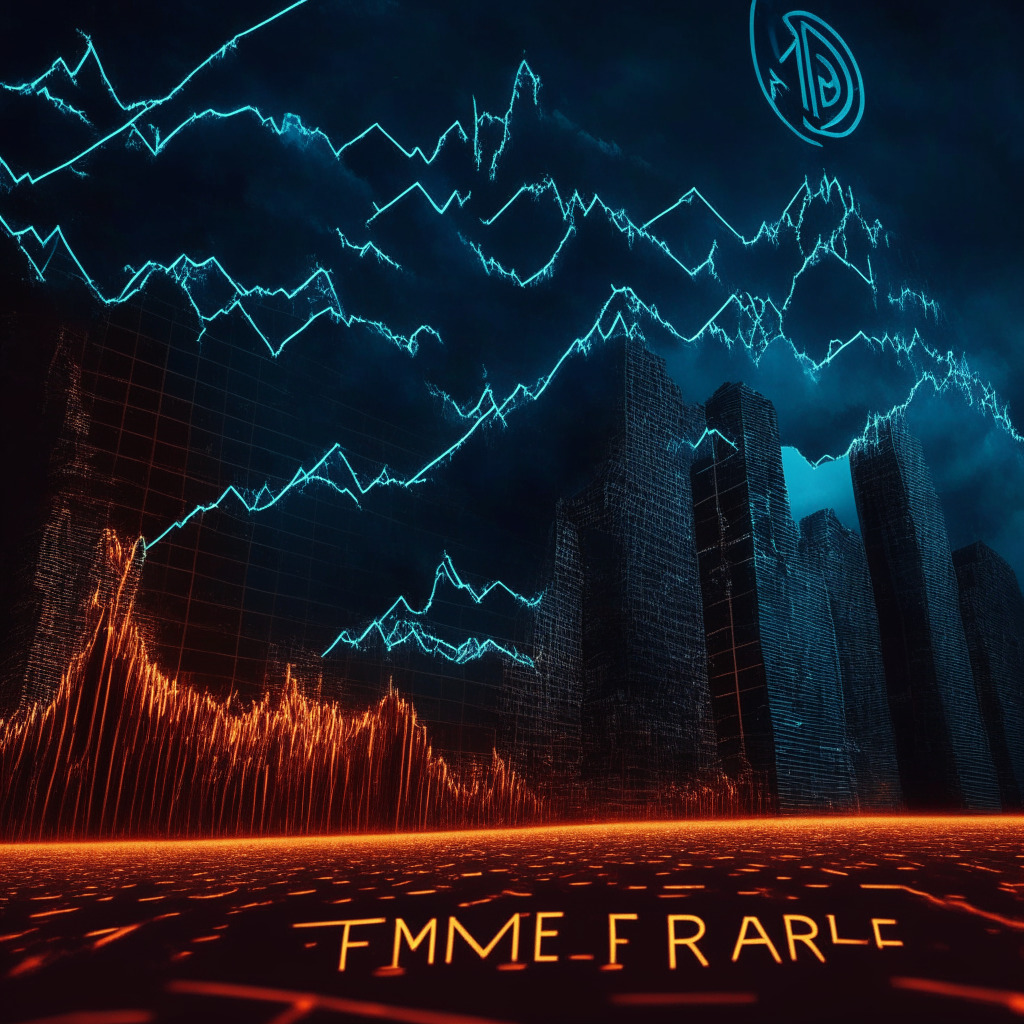Amid economic uncertainty and cryptocurrency market turbulence, investors may explore cryptos with strong fundamentals and favorable technical analysis, such as WSM, BNB, ECOTERRA, INJ, YPRED, FTM, and LPX. Careful analysis of fundamentals and technical indicators can help navigate the current market environment successfully.
Day: June 14, 2023
SEC’s Crypto Rule Change: Balancing Innovation and Regulation in a Complex Landscape
The complex regulatory landscape surrounding the crypto industry faces pushback from House Financial Services Committee Republicans, who urge the SEC to rescind a proposed rule change on defining “exchange.” Opponents argue that the SEC’s overreach hinders innovation and technological advancements within the digital asset ecosystem, further impacting the broader U.S. economy.
Blockchain’s Role in Film Industry: A Creative Revolution or Risk to Artistic Freedom?
The documentary “Bad Like Brooklyn Dancehall” highlights the connection between dancehall music and blockchain technology, as it was supported by Decentralized Pictures, a nonprofit using crypto tokens and community voting to fund cinematic arts. The film’s production explores the potential of marrying artistic creations and blockchain, showcasing the pros and cons of this intersection.
Generative AI’s Trillion-Dollar Impact: Balancing Economic Growth and Workforce Risks
Generative AI’s rising popularity, with applications like ChatGPT and Stable Diffusion, could contribute up to $4.4 trillion annually to the global economy, revolutionizing various industries. McKinsey predicts automation of 60-70% of work activities while managing workforce transitions and risks remains a challenge.
XRP Price Drop Amid Ripple-SEC Lawsuit: Analyzing the Impact on Investors and Future Value
XRP prices experienced a significant 8.5% drop in one day amid a digital asset market sell-off. The decrease coincided with Bitcoin and Ether losing crucial price levels after the Federal Reserve’s interest rate decision. Traders earlier anticipated a document release related to Ripple Labs’ ongoing lawsuit with the U.S. Securities and Exchange Commission that could boost XRP’s value.
French Digital Asset Mediation Surge: Balancing Progress, Disputes, and Market Safety
According to the French stock market regulator AMF’s annual report, digital asset-related mediations and registered digital asset service providers (DASPs) significantly increased in 2022. This growth could indicate increased industry adoption but also raises concerns about potential disputes and the need for stronger oversight.
Crypto Enthusiast Mayor’s Presidential Bid: A Push for Blockchain or Risky Move?
Miami’s “Bitcoin Mayor” Francis X. Suarez has filed to run for U.S. presidency, which could stimulate growth and adoption of digital currencies and blockchain-based services. His presidential bid may prompt a profound conversation on cryptocurrency’s role in shaping America’s economy, but also raise concerns about potential risks, vulnerabilities, and conflicts of interest.
SEC’s Impossible Registration Demands: The Debate on DEX Regulation and Cryptocurrency Authority
Coinbase Chief Legal Officer Paul Grewal opposes the SEC’s proposed rule change requiring decentralized exchanges (DEXes) to register, saying it’s impossible and fundamentally flawed. The rule change extends SEC authority to products ill-equipped for regulatory requirements and has been criticized by US lawmakers and crypto advocacy groups.
ApeCoin DAO Leadership Salaries Debated: Are They Fair or Overpaid?
ApeCoin DAO’s leadership and community council face criticism over six-figure annual salaries, sparking debates on Twitter. Despite the accomplished expansion of the ecosystem, concerns arise over value creation and potential re-evaluation of salary structures.
Urgent Need for Crypto Regulations: Debating the Pros, Cons, and Conflicts
A Congressional hearing discussed the Digital Asset Market Structure Discussion Draft, aiming to establish a regulatory framework for digital assets. The industry seeks regulatory clarity amid concerns that insufficient action could have “devastating consequences” for the U.S.’s global digital economy competitiveness.
Synquote: Revolutionizing DeFi Options with Undercollateralized Trading & Social Logins
Decentralized finance platform Synquote launched, utilizing social logins and undercollateralized trading to attract liquidity providers. Handling large trades with less slippage, Synquote uses an off-chain, peer-to-peer request for quote protocol for better flexibility in orders and offering undercollateralized trades to appeal to large institutions, while ensuring conservative risk-management practices.
Apple’s Clash with Crypto Wallets: Balancing Innovation, Regulation, and Safety
Apple recently rejected non-custodial Lightning-enabled bitcoin wallet, Zeus, after a disagreement concerning decentralized social media platform Damus. Zeus allegedly violated Apple’s guidelines requiring appropriate licenses for cryptocurrency transmission. The compromise between Zeus and Apple is essential for the growth and adoption of cryptocurrencies.
Bankrupt Voyager Set to Reopen: A Hopeful but Cautious Moment for Crypto Investors and Markets
Voyager’s platform is set to reopen between June 20 and July 5, allowing creditors to withdraw about 35% of their crypto following bankruptcy proceedings. This comes after the company’s core business lines were shuttered and customer transactions halted last year. The ongoing litigation involving Three Arrows Capital and FTX could potentially boost Voyager’s recoverable assets and impact the amount customers can reclaim.
Fed’s Hawkish Pause: Golden Opportunity or Risky Gamble for Bitcoin Investors?
The Federal Reserve’s decision to hold interest rates steady and possibility of future rate hikes raise questions about investing in Bitcoin. Amid uncertainty, investors must carefully monitor Bitcoin and alternative cryptocurrencies to make informed investment decisions, staying informed and agile to capitalize on emerging assets.
Fed Pause on Interest Rate Hikes: Bitcoin Risks and Nasdaq Tech Stock Gains Explained
Despite Federal Reserve Chair Jerome Powell’s pause on interest rate hikes, Bitcoin options data suggest downside risks, including a potential drop in BTC price to $25,000. Investors are drawn to tech companies while avoiding Bitcoin, with investment product outflows totaling $88 million in the week ending June 10.
SEC’s Crypto Dilemma: Balancing Innovation and Investor Protection or Stifling Growth?
The SEC lawsuit against Binance and Coinbase raises questions about the regulator’s approach towards crypto, attempting to balance promoting innovation and ensuring investor protection. Critics argue that the current “regulation by enforcement” oversteps boundaries, impairing crypto sector growth, while the lack of a spot Bitcoin ETF in the US adds fuel to the debate.
Exploring ChatGPT Plugins: Boon or Bane for Human Decision-Making?
The rapid growth of AI, fueled by ChatGPT plugins, has led to advancements in diverse fields like education, law, and gaming. As over 400 plugins now cover areas such as blockchain analytics and weather predictions, concerns arise about overdependence on AI chatbots, emphasizing the importance of balancing convenience with critical thinking.
Jack Dorsey’s $5M Donation to Bitcoin Nonprofit Brink: Supporting Developers or Short-Sighted Move?
Jack Dorsey’s Start Small funding group donated $5 million to Brink, a Bitcoin-focused nonprofit organization supporting cryptocurrency developers. The funds will be distributed as $1 million annual donations over five years, boosting developer efforts for the leading cryptocurrency and fostering innovation within the industry.
Ethereum Blast: Casual Crypto Gaming or Ad-Heavy Time Sink? Pros, Cons & Conflict
Ethereum Blast is a casual mobile color-matching puzzle game that rewards players with cryptocurrency. Developed by Bling Financial, it offers easy gameplay and the opportunity to earn small amounts of Ethereum or Bitcoin while passing time. However, substantial ads and diminishing returns may deter some players.
Crypto Volatility Persists: FOMC Pause, SEC Charges, and Future Rate Hikes
The crypto market remains volatile following the June 14 FOMC announcement pausing rate hikes, affecting Bitcoin price. Muted crypto price action potentially reflects lingering effects of SEC charges against Binance and Coinbase. While interest rate hikes are paused, regulation remains a major threat, with SEC enforcement actions increasing and investor sentiment remaining low.
Federal Reserve Rate Decision: Impact on Crypto Market and Inflation Control Battle
The Federal Reserve’s decision to maintain current interest rates has sparked mixed feelings and impacted crypto markets like Bitcoin and Ethereum. This highlights the delicate balance the Fed must strike between supporting economic growth and controlling inflation, amidst ongoing regulatory challenges in the digital assets industry.
EigenLayer’s Ethereum Restaking Protocol: Game Changer or Risky Endeavor?
Seattle-based EigenLayer has introduced a game-changing restaking protocol on Ethereum mainnet, allowing staking of ETH using liquid staking tokens. Offering increased flexibility and opportunities, its success depends on smooth integration with existing protocols and addressing potential security concerns.
XRP Price Recovery Stalls: Analyzing the $0.55 Resistance and Narrow Range Formation
The XRP price recently faced resistance at $0.55, leading to a sideways trend between $0.54 and $0.486. The current market conditions for XRP show a mix of bullish and bearish indicators, making the future trend uncertain. Traders should monitor market sentiment and technical analysis closely.
FPG Cyberattack: A Wake-Up Call on Cryptocurrency Security and Audits
The recent cyberattack on Floating Point Group, resulting in a loss of $15-$20 million in crypto, raises concerns regarding the effectiveness of current security measures, certifications, and audits in protecting digital assets. As the industry evolves, collaboration and comprehensive security strategies are crucial to address the ever-present challenges of securing cryptocurrencies.
Binance Withdraws from Cyprus: MiCA Compliance and the Future of Crypto Exchanges
Binance, the world’s largest cryptocurrency exchange, is withdrawing from Cyprus ahead of the EU’s Markets in Crypto Assets (MiCA) legislation in 2022. The company plans to focus on regulated entities in countries like France, Italy, and Spain, aligning its business with MiCA to ensure compliance. Tightened regulations and recent legal challenges may prompt a shift in the crypto landscape, emphasizing regulatory compliance.
BNB Rebounds: Oversold Status Brings Bullish Hope Amid Bearish Bets and SEC Pressure
BNB price climbed nearly 4% to $253 after bouncing back from a six-month low of $220. This recovery is attributed to its “oversold” status, with the daily relative strength index reaching its lowest since March 2020. An increase in short positions liquidations may also contribute to the price rebound.
Ethereum’s EigenLayer Launch: Restaking Revolution and Its Impact on Security & Flexibility
Ethereum mainnet recently deployed EigenLayer, a restaking protocol supporting tokens like stETH, rETH, and cbETH, aimed at extending Ethereum’s security to bridges, oracle networks, and consensus mechanisms. With EigenLayer, stakers grant permission to smart contracts while earning rewards and delegating validation, enhancing security and offering flexibility for stakers, operators, and actively validated services.
EU AI Act: Balancing Innovation and Ethics in Artificial Intelligence Regulation
The European Parliament recently passed the EU AI Act, aiming to promote human-centric and trustworthy AI while protecting health, safety, and fundamental rights. The act restricts certain AI services and products, including biometric surveillance and predictive policing, while allowing generative AI models like OpenAI’s ChatGPT and Google’s Bard, provided they are clearly labeled. The challenge lies in balancing innovation and safety in AI development.
Stablecoin Stability: MakerDAO’s Shift to Spark Protocol and Lessons from the USDC Depreciation
MakerDAO is switching to the Spark Protocol to improve DeFi liquidity and stablecoin resilience after the recent USDC depeg. Through direct deposits on automated market makers, the protocol offers better rates and aims to enhance MakerDAO’s stability mechanisms and functionality across various layer-2 protocols.
Fed’s Interest Rate Pause: Implications for Crypto and Inflation Risk Hedging
The US Federal Reserve’s pause in interest rate hikes signal potential future rate hikes, impacting the cryptocurrency market. Investors may turn to risky assets like Bitcoin to hedge against inflationary risks, highlighting the importance of thorough market research in volatile cryptocurrencies.
BNB’s Regulatory Uncertainty vs. yPredict’s AI-Powered Crypto Trading: Weighing the Risks
Binance Coin experiences a 9% bounce amid an SEC lawsuit, causing uncertainty for investors. Meanwhile, AI-powered platform yPredict’s native $YPRED token gains attention for its groundbreaking technology and promising investment potential.
Fed’s Unchanged Interest Rates: Implications for Bitcoin’s Future and Economy Stability
The Federal Reserve’s decision to maintain current interest rates has potential implications for Bitcoin’s future performance, with easing monetary pressure possibly contributing to a positive trajectory in 2023. Investors should stay informed on policy decisions and their effects on inflation for long-term success in cryptocurrencies.































